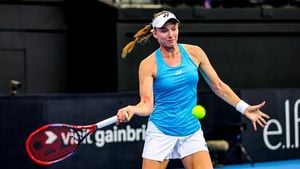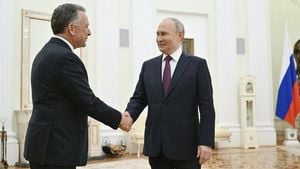Manchester United has announced significant reductions to its staff as part of an overarching transformation plan aimed at restoring the club's financial stability. On February 24, 2025, officials confirmed they anticipate the elimination of up to 200 jobs, coming after 250 layoffs last year under the new ownership of Sir Jim Ratcliffe.
According to the club's statement, these job cuts are seen as necessary actions to help reverse five consecutive years of financial losses. CEO Omar Berrada highlighted the pressing nature of these changes: "We have lost money for the last five years in a row. This cannot go on." The potential redundancies are subject to consultations with affected employees, and the consultation process is set to last between three and four months.
The financial strain on Manchester United has become increasingly apparent, with reports indicating the club's losses exceed £370 million over the past five years. For the second quarter of the fiscal year, the club recorded losses of £27.7 million, adding urgency to the measures being implemented. Berrada stated, “These hard choices are necessary to put the club back on a stable financial footing.”
According to last week's accounts, Manchester United paid out £14.5 million to replace several key staff, including manager Erik ten Hag, following his termination. Current manager Ruben Amorim has struggled to improve the team's standing, which sits at 15th place after recent performances. The women’s team, conversely, has shown more promise this season, ranking second in the Women’s Super League.
United has indicated its ambitions extend beyond mere financial recovery; the long-term goal is to create "a more solid financial platform from which the club can invest in men’s and women’s football success and improved infrastructure." The recent restructuring also includes relocating certain staff from Old Trafford to the training base at Carrington, where expenses will be cut—including the end of free lunches at Old Trafford saving the club over £1 million annually.
Manchester United's decisions reflect broader efforts to improve operational efficiency and financial sustainability. The process of job cuts is compounded by rising ticket prices, with matchday tickets now costing £66 each, reflecting the fiscal pressures the club faces.
Ratcliffe, as co-owner, has consistently indicated the need for fiscal discipline, having already undertaken multiple cost-cutting measures since taking his stake. While the job reductions will account for about 450 positions—or nearly 39% of the workforce—executives assert these moves are pivotal to rejuvenate the club's economic footing.
Despite these challenges, Manchester United remains one of the wealthiest clubs globally, ranking fourth last month by Deloitte’s annual Football Money League. Yet, the club's current performance and financial stability leave much at stake. According to projections, should the team finish lower than its historical performance, it may incur diminished revenues from merit payments—potentially taking more than £20 million off last season's earnings.
Looking forward, United’s prospects hinge not just on immediate tactical adjustments but also on major infrastructural decisions. The fate of their iconic stadium, Old Trafford, remains undecided, with Ratcliffe weighing options between renovation costs pegged at about £1.5 billion or the costs of building anew, which could exceed £2 billion.
While Berrada prioritizes on-field success, there’s growing concern about how financial constraints may impact strategic investments, such as transfer market activities and enhancements to the club’s overall infrastructure. Missing out on lucrative opportunities continues to cast shadows over the club’s ambitions as they seek to reclaim their dominance both domestically and internationally.
Manchester United stands at a crossroads: as it grapples with the practical realities of its current situation, the club aims to transform its fortunes through calculated restructuring and tough financial decisions. Berrada encapsulated this challenge, stating, "We cannot invest in these objectives if we are continuously losing money." The focus must now shift to successful management and revitalization efforts, as the iconic club strives to fulfill its legacy of excellence against mounting hurdles.



